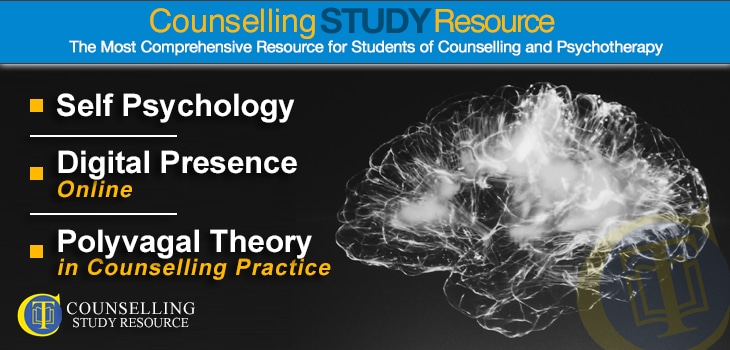174 - Polyvagal Theory in Counselling Practice
Self Psychology - Digital Presence Online
In episode 174 of the Counselling Tutor Podcast, Rory Lees-Oakes and Ken Kelly look at self-psychology in the 'Student Check-In'. Then, in 'Digital Counselling Revolution', they discuss the importance of being mindful of how you present yourself online. Last, 'Practice Matters' focuses on the polyvagal theory in counselling practice, which is the topic of a new lecture by counsellor and trainer Emma Chapman.
This is the last episode before the Christmas/New Year break - and Rory and Ken will be back with episode 175 on 9 January 2021.
Self Psychology (starts at 1.35 mins)
2020 has been a challenging year, during which the COVID-9 pandemic has led to many people feeling disconnected from their loved ones. The theory of self psychology - developed by Austrian doctor and psychoanalyst Heinz Kohut - is highly relevant to this situation.
Rory explains about self psychology, a topic that has cropped up on the Counselling Tutor Facebook page, and also appears now and then in our Counselling Tutor postbag.
Self psychology relates closely to the importance of building a strong therapeutic relationship in counselling, highlighting the importance of human interaction. It also links to Bowlby's attachment theory.
While the notion of the therapeutic relationship as a key part of therapy originated in the person-centred approach, these days the centrality of this human connection is acknowledged by all modalities, for example in the third-wave cognitive behavioural therapies and in transactional analysis (via the relational turn).
Having an awareness and understanding of self psychology can therefore support all kinds of therapists in their work, and so is an important area to learn about.
Rory has produced a handout on self psychology, which you can download here.
Digital Presence Online (starts at 14.40 mins)
Ken and Rory provide tips on this important area:
- Do be careful about how you present yourself online - as clients and even potential employers may well search your name to check they feel they can trust us and our professionalism.
- You may wish therefore to make time for an audit of your online presence, looking at what may appear about you personally as well as professionally.
- Bear in mind too that people you know might tag you in their own posts or photos: you may wish to ask them not to do this.
- Ensure that you have your privacy settings configured in the right way for any personal accounts on social media etc., so that only your friends and family can view your personal information.
- Try to ensure that any picture you use online for your professional profile gives the right impression, and is a reasonable likeness.
- Avoid using pictures that are out of date - and so, if you change your appearance markedly, think about updating your profile picture.
Your online presence is covered in greater depth in our course, Online and Telephone Counselling, which covers this topic in greater depth.
Polyvagal Theory in Counselling Practice (starts at 27.00 mins)
Rory and Ken speak about polyvagal theory in counselling practice, the topic of an exciting new lecture by Emma Chapman.
Polyvagal theory - developed by Stephen Porges - is highly relevant to working with trauma, and indeed with all other human experiences, as it helps us understand how all emotions are reflected in the body.
Being aware of the physical manifestation of emotions can make a huge difference both to your own personal development and to how you work with clients.
Rory points out an interesting link with bereavement work, where it is not unusual for bereaved clients to present with physical symptoms that mirror the conditions of which their loved one died.
Emma's lecture on the polyvagal theory in therapy is not to be missed, and we hope to bring you more lectures from her in future on this growing field of research-based practice.
In the meantime, Emma's new lecture will point you to valuable reading on polyvagal theory, including the well-known book by Bessel van der Kolk, The Body Keeps the Score.
Rory and Ken end the episode by wishing all listeners a good break over the holiday period.


